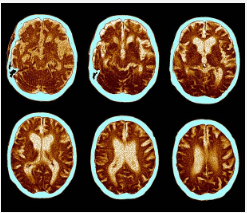Recent research has uncovered a potential root cause of Alzheimer’s disease, challenging the long-standing focus on beta-amyloid plaques and tau tangles. This new study, conducted by a team from Stanford University School of Medicine and led by Michael Haney, suggests that the buildup of fat droplets in brain cells may play a crucial role in the development of Alzheimer’s disease.
Traditionally, Alzheimer’s has been associated with the accumulation of beta-amyloid plaques between nerve cells and tau protein tangles within them. These protein aggregates have been the primary targets for therapeutic interventions aimed at slowing or preventing the disease. However, despite numerous trials, treatments targeting these proteins have yielded only modest benefits.
The new research shifts focus to lipid metabolism within the brain. The team explored the role of the APOE gene, which is known to encode a protein involved in fat transport. Specifically, they investigated the APOE4 variant, which is the strongest genetic risk factor for late-onset Alzheimer’s disease. People with two copies of the APOE4 gene have a significantly higher risk of developing Alzheimer’s compared to those with other variants such as APOE2, which is associated with the least risk.
Using single-cell RNA sequencing, the researchers analyzed brain tissue samples from individuals with different APOE variants. They discovered that the APOE4 variant is linked to higher levels of an enzyme in brain immune cells (microglia) that promotes fat accumulation within these cells. This lipid buildup, triggered by amyloid presence, is hypothesized to cause further cellular dysfunction, including tau accumulation, leading to neuronal death and Alzheimer’s symptoms.
This novel insight into Alzheimer’s pathogenesis opens new avenues for therapeutic development. Targeting the metabolic pathways involved in fat accumulation could provide more effective treatments than current strategies focusing solely on amyloid and tau proteins. This could potentially lead to breakthroughs in preventing or delaying the onset of Alzheimer’s in those genetically predisposed to the disease.
Further supporting this lipid hypothesis, previous studies have shown that other genes involved in Alzheimer’s risk also play roles in lipid metabolism and the immune system, suggesting a broader involvement of lipid metabolic processes in the disease. Additionally, the research underscores the importance of early monitoring and potential interventions for individuals with the APOE4 gene, given their elevated risk and earlier onset of pathological changes.
In conclusion, while amyloid and tau proteins remain significant in the context of Alzheimer’s disease, the new focus on fat metabolism provides a promising direction for future research and treatment strategies. This paradigm shift could lead to more targeted and effective therapies, ultimately improving outcomes for those at risk of or suffering from Alzheimer’s disease.



